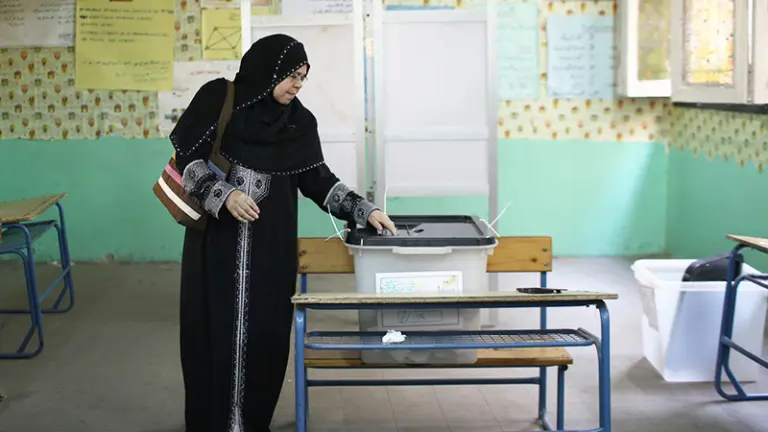
Egyptians are currently casting their ballots in parliamentary elections, the final results of which will not be announced before late December 2025. In two phases of voting held in different regions of the country, the first phase of which finished on November 11, voters are choosing 568 of a total of 596 deputies in the House of Representatives. Half of the lawmakers will be chosen from party lists while the other half will come from the winners of individual district contests. President Abdel-Fattah el-Sisi will appoint a further 28 members—a privilege he no doubt cherishes in Egypt’s managed “democracy” that ensures his control of the Egyptian parliament.
In October 2025, Sisi appointed 100 of 300 members of Senate, Egypt’s upper house of parliament that has only consultative powers, following August 2025 elections in which Sisi’s supporters won overwhelming majorities both on the party lists and among individual district candidates. Voter turnout was officially a mere 17.1 percent (up from 14.2 percent in 2020), reflecting the same general apathy and disinterest in the electoral process that has often produced rubber stamp parliaments in the past. No turnout estimates have yet been announced for the first stage of the current parliamentary election, but if the official figures for the Senate and for the 2020 parliamentary vote of 29 percent are any guide, the actual participation rate this time around is also likely to be even lower.
Despite the Egyptian government’s declared adherence to the principle of free and fair elections, the polls have been organized mainly to extend the authoritarian rule of the Sisi regime. The new lower house will serve a five-year term and manage the process of either electing Sisi’s successor or amending the Egyptian constitution to allow Sisi to remain in office after his current and third term ends in 2030. In either case, Sisi and the regime have a clear interest in ensuring that representatives support the status quo; opposition candidates are a nuisance to authoritarian rule and most are not even allowed to run.
Egypt’s winner-take-all electoral law allows coalitions, parties, and individuals loyal to the regime to dominate the elections. Opposition parties have almost no chance of successfully challenging the party lists or candidates fielded by supporters of the regime for several reasons, including broad repression, the high cost of running in the elections, administrative and health requirements for candidacy, and the pro-regime bias of the courts that supervise the electoral process. In the August 2025 Senate elections, the National List for Egypt, a pro-regime coalition, won 175 of the 200 contested chamber seats. With Sisi’s appointment of the other 100 senators, this victory assured the regime’s overwhelming control of the upper house. The current round of legislative elections will inevitably produce a similar outcome.
The Senate and the House of Representatives elections come as the Egyptian regime continues to detain journalists and human rights advocates and to restrict the freedoms of assembly and expression. The government has even prohibited Egyptians from protesting the ongoing Israeli genocide in Gaza. In June 2025, the authorities arrested and detained Egyptians and foreign nationals preparing to march to Rafah to demand that Israel end its blockade on the Strip. The foreigners were summarily deported and one local activist was tortured in prison.
Not only will the new parliament preside over the potential extension of Sisi’s rule, but it will likely be a willing partner in further consolidating the regime’s authoritarianism. The Egyptian military, from which Sisi emerged to lead the 2013 coup against the country’s only democratically elected president, has for decades enjoyed unfettered influence in the Egyptian polity and economy. This reality is unlikely to change in the near future. Egypt’s model of economic development gives the military a prominent, if not dominant, role in the economy, one that the International Monetary Fund has recently decried as crowding out private enterprise and “distort[ing] the market.” In January 2024 the House of Representatives gave the military yet more power when it passed a law expanding the military courts’ power to prosecute civilians, thus further eroding Egyptians’ civil rights and the rule of law that should protect them.
Egypt’s legislative elections come as the country suffers from an enormous public debt—87 percent of the gross domestic product—an official unemployment rate of 7.4 percent (with the actual figure likely much higher), and a skyrocketing inflation rate of 20 percent, among other ills. Such economic indicators are unlikely to improve so long as Egypt’s crony capitalism continues. More to the point, it is difficult to imagine how the elected members of the upper and incoming lower houses will change the fundamentals of the system when the overwhelming majority of their business activities benefit from its endemic corruption.
As Egypt faces increasingly complicated domestic and regional challenges, and as its economy slides further into crisis, Sisi will be happy with a pliant legislative branch that does not question his authority. The current election promises to produce a legislative chamber that will reflect and entrench the political, social, and economic status quo. Like other elections in Egypt’s highly choreographed political system, this vote is merely another periodic simulation of democracy that attempts to fool the world into believing that Sisi’s authoritarian regime actually cares about the hopes and aspirations of the Egyptian people.
The views expressed in this publication are the author’s own and do not necessarily reflect the position of Arab Center Washington DC, its staff, or its Board of Directors.
Featured image credit: Shutterstock/Mehmet Ali Poyraz

